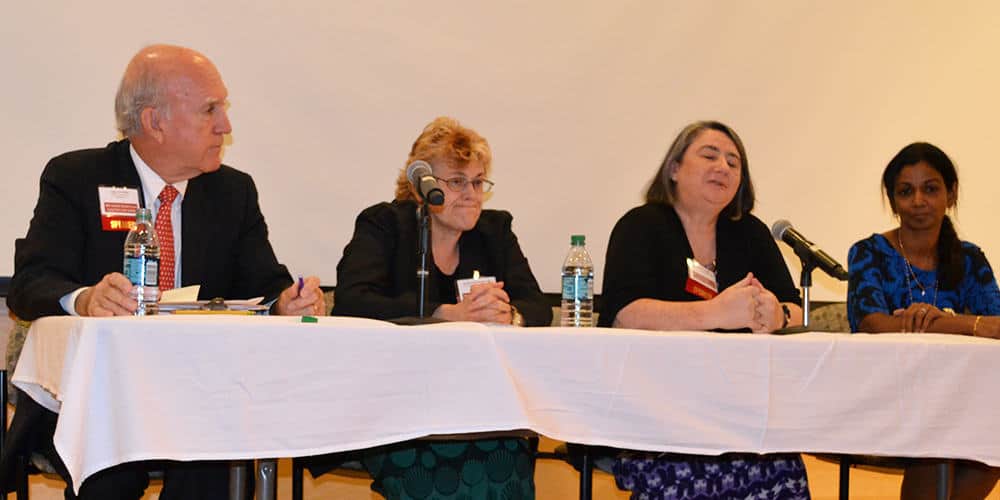Impaired Driving is Focus at 18th Annual Geriatrics Conference
| Oct. 3, 2017 | It’s a subject that Germaine Odenheimer, M.D., finds harder to talk about to patients than having a terminal illness: impaired driving, and that’s what she wanted to speak about to the audience at the 18th annual Geriatric Update and Long-term Care Conference held at UAMS.
“One of the reasons I got interested in this area is because I found this topic of driving was the most difficult topic I have to deal with,” Odenheimer said recently to a conference audience. “It was harder than telling them they have Alzheimer’s disease and even harder than telling them they were going to die. There’s something about this topic that is so powerful. I felt I needed to learn more about it and how to deal with this issue. It became the focus of my research interest.”
Odenheimer, an associate professor in the Donald W. Reynolds Department of Geriatric Medicine at the University of Oklahoma’s College of Medicine, was a guest speaker at the conference held from Sept. 21-23 at the UAMS Donald W. Reynolds Institute on Aging.
Throughout the three days, speakers, presentations and expert panels covered a range of topics from trauma in the elderly, infection control and food disparities to legal and social issues in geriatric care. More than 120 people attended the conference, which was sponsored by the Arkansas Geriatric Education Collaborative at UAMS.
The conference has been supported annually by Jeanne Wei, M.D., Ph.D., executive director of the Reynolds Institute and chair of the Donald W. Reynolds Department of Geriatrics in the UAMS College of Medicine, to provide the latest information to physicians and other health professionals, as well as caregivers to the aging population.
“The updates are giving important and practical information to professionals directly involved in senior care,” Wei said. “Update speakers aren’t presenting abstract concepts. They’re communicating the latest findings and best practices. Feedback over the years has shown the tremendous value our attendees find in the information communicated at the update. Dr. Germaine Odenheimer’s presentation is a great example of that.”
Odenheimer said as young drivers mature, they progress from being high-risk drivers with a high fatal crash rate to lower-risk experienced drivers through early and middle adulthood. Drawing further on vehicle collision data, she said the crash rate doesn’t increase again until age 75 when it starts slowly and steadily rises again. At 85 and older, it exceeds the fatal crash risk for teenagers.
In almost every state, the driver is held responsible for accidents that occur when driving is impaired. But several years ago, the American Medical Association determined that physicians need to play a role in deciding when a patient is fit to drive or not and even have an ethical obligation to do so, Odenheimer said.
Odenheimer said a physician can refer the patient to an occupational therapist for evaluation. In some cases, a change in medication, treating an underlying condition that is contributing or causing the impairment or limiting the patient’s driving can be enough to resolve the impairment or reduce the risk.
“Most people wait until there is a crisis,” she said. “The time to start that conversation is early. If they have a diagnosis that is likely to lead to loss of driving, like dementia or Parkinson’s or other similar conditions, then you need to have that conversation early. It’s much easier to start the conversation before they have to stop.”
Following Odenheimer’s presentation, she also took part in a four-person panel discussion on the topic that included Little Rock District Court Judge Vic Fleming, who oversees a traffic court; Lou Ann Eads, M.D., a geriatric psychiatrist at the UAMS Psychiatric Research Institute; and Masil George, M.D., a geriatrician and pain management specialist at the Reynolds Institute.
As part of the panel, Fleming reviewed the legal processes that can be used to determine whether or not someone’s driving is impaired and unsafe.
He said he too had to work through the issue with a family relative, who passed a driving test and then had three car accidents in two years.
“If your loved one has an offense pending in front of a traffic judge, and you know that, by golly, just go with them,” Fleming said. “We judges get it. If the defendant is in his or her nineties and there are a couple of people with them who are in their forties or fifties, then it’s usually a niece or nephew, son or daughter who wants to make a comment to get a license revoked. We’ll listen.”
In dialogue with members of the audience, the panel engaged in an in-depth discussion of the role physicians play in helping patients and families wrestle with the issue of impaired driving.
Eleven geriatrics research posters also were on display at the conference. A number attended from out of state, including some who have participated for as many as 13 consecutive years.

